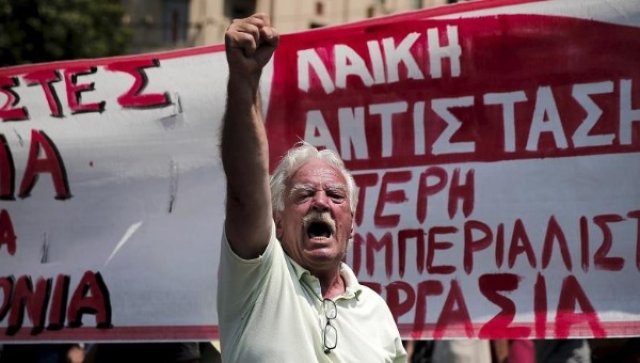
The Greek Parliament voted in the early hours of July 16 to back the deal agreed to by Prime Minister Alexis Tsipras on the tough economic measures demanded by Greece's creditors.
The vote came despite street protests and strikes -- and in the face of a statement released the day before by the governing SYRIZA party's central committee against the deal.
The new law includes tax raises and an increase in the retirement age. Amid a heated debate, Tsipras addressed the Parliament and sought to explain the deal, which goes against the anti-austerity platform SYRIZA was elected on. The lawmakers voted as pressure mounted due to a conference call set to be held with the Eurogroup at 11.00 am local time.
Tsipras said he did not believe in the deal, but urged MPs to agree to the measures in order to avoid the collapse of the Greek economy. All up, 228 MPs voted for the deal, while 64 voted against, six abstained and two did not show up.
Although the bill was passed, 32 SYRIZA MPs voted against the deal. About 50 protesters were arrested by police forces outside the Parliament, as protests turned violent close to midnight. After the vote, Greece will now enter further negotiations for a US$86 billion bailout deal.
The vote came despite the SYRIZA central committee issuing a statement opposing the deal. The website of the party's newspaper Avgi said 109 members of the 201-person body voted for a statement that declared: “The agreement signed with the 'institutions' was the outcome of threats of immediate economic strangulation and represents a new Memorandum imposing odious and humiliating conditions of tutelage that are destructive for our country and our people.”
Ahead of the vote, Greek civil services workers went on strike to protest the austerity measures in the deal. Pharmacies closed and train stations shut down as part of the 24-hour walk-out staged by the country's main public sector union ADEDY to reject the pension reforms, tax hikes, and other measures demanded of Greece.
The measures demanded of Greece in the harsh deal come as a Slate report detailed huge interest from loans allowed Greek creditors to make significant profits.
TeleSUR English said on July 15 that, according to a document released by the European Commission and the European Central Bank (ECB) meant to evaluate the financial needs of Greece, the ECB made a profit of about US$3.6 billion upon the purchase of Greek bonds since the beginning of last year.
The greatest irony, emphasised the report, is that Greece owes almost the same amount of money to this institution on July 20: US$3.8 billion. Considering that the Greek bonds owned by the ECB only represent a small part of the Greek debt -- US$30 billion out of a total of US$342 billion -- the most likely scenario is that many more creditors are making profits out of the Greek debt, starting with the European Financial Stability Facility, the private markets, the International Monetary Fund, and European states like Germany and France.
[Compiled from TeleSUR English.]